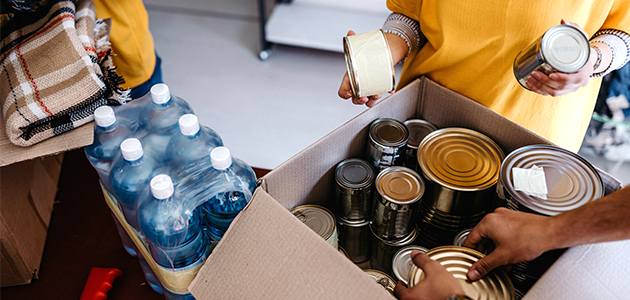While all donations are appreciated, many food banks have lists of nonperishable products that they really need for their community. In this article, we’re covering how to find out what food banks need, what items you may want to re-think donating and more.
Checking in with your food bank
The first step to take when looking into what a food bank needs is to visit their website. Most food banks will post lists of nonperishable foods they’re currently lacking. You’ll often find lists of foods that they have too much of and would like to avoid. If you can’t find an up-to-date list on a food bank’s site, it’s best to call ahead.
Foods that are typically needed
Depending on the time of year, food banks may have the need for different foods. The list below contains food items that are generally needed all year round.
- Canned fruits. These foods can be high in vitamin C and have the added benefit of staying fresher for longer. Vitamin C in fresh fruit will often diminish over time due to being exposed to air.1 Canned fruits are a great option for food banks who need their food donations to stay fresh for as long as possible.
- Canned fish. Canned salmon and other fish are high in protein and omega-3 fatty acids and provide an easy way to include seafood into weekly meals.
- Whole grain foods. Foods like oatmeal, whole-grain pasta, barley and quinoa are all high in fibre and minerals like iron.2 Whole grain foods are always in need because they’re a staple in digestive health.
- Crackers. These are always appreciated donations because they are great snacks and work well with plenty of meals. Typically, healthier versions like whole grain crackers are more in demand.
- Granola bars. Granola bars are a great donation that go a long way for families in need with children. If you can, try to find nut-free bars so you can avoid any allergy-related issues.
- Rice. Rice is a simple food to prepare and works with a variety of dishes. Brown rice provides more fibre so it’s a good idea to choose that over white rice when donating.
- Cooking oils. Olive and canola oil is usually pretty sought after for food banks because they can be pricier and out of reach for many people.
Have you thought about donating these items?
While the above list is a great starting point for food donations, there are many foods and household items that are overlooked. Add these to your donations to help more people.
- Herbs and spices. Dried herbs and spices are easy to find in grocery stores and go a long way to making tasty dishes. Try and stick to popular ones like pepper, oregano and basil when adding them to your donations.
- Powdered milk. Milk is a staple in most homes. Since refrigerated milk has a short expiration window, opt to give powdered milk instead. You can also donate soy, almond or oat milks that have a longer shelf life.
- Dog and cat food. People have furry family members that they need to look after as well. When a family is in need and has pets, unfortunately they can go overlooked by donors. Add these products to your donation list and help their pets out.
- Toiletries. Shampoo, toilet paper, feminine products and other essentials can make a huge difference to a struggling individual or family.
Things to avoid donating
- Open food. Food banks typically do not accept open food items. When you donate, make sure your donations are sealed beforehand.
- Unlabeled food. Anything that’s missing a wrapper or label will often not be accepted.
- Glass jars. Food that comes in glass jars like pasta sauce or pickles may not be accepted because they could break in transit. It’s best to check with your local food bank to be sure before you donate food stored in glass.
- Homemade goods. It’s always a nice gesture, but homemade foods shouldn’t be donated to food banks, nor will they likely be accepted. Pre-packaged foods are your best bet when donating.
How Foresters can help
In the spirit of giving back and with Volunteers’ Week coming up in June, Foresters members can use their Foresters Care and Community Volunteer grants to donate to food banks and easily make a difference in someone’s life.
Foresters Care grants provide you with a £200 grant that can be used to purchase food for donations.
Community Volunteer grants offer up to £2,000 and are a great way to organise larger donation activities like assembling donation care packages.
You can access these amazingly helpful benefits and so much more by heading over to MyForesters.com now.
SOURCES
1 https://www.foodnetwork.com/healthyeats/healthy-tips/2013/10/canned-fruit-good-or-bad
2 https://www.healthline.com/nutrition/iron-rich-plant-foods#TOC_TITLE_HDR_6




